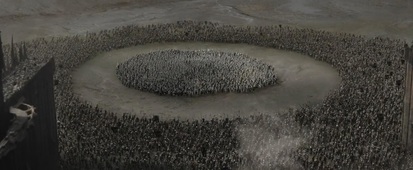 Sometimes we know what to do when facing a big decision or battle. We get in there and do it. But there are sometimes when the opponent is so large, and our resources so small, that we are just at a loss. It is in those times that the Christian has to admit to their limitations and make known their resolve to utterly rely on God. God will then rise up in a powerful way to provide victory. Such was the case when Jehoshaphat the king of Judah faced off against a group of enemies. He recounted to the people God's faithfulness and ultimately said, "We do not know what to do., but we look to God." This doesn't seem like a great strategy in the natural realm. But it is exactly what God is looking for. God was moved by this exhibition of total trust, and gave them word that He would deliver them if they would only stand and watch the victory... which they did. Here is the rest of the story... "In the morning they got up early and went out to the wilderness of Tekoa. As they were about to go out, Jehoshaphat stood and said, 'Hear me, Judah and you inhabitants of Jerusalem. Believe in Yahweh your God, and you will be established; believe in His prophets, and you will succeed.' Then he consulted with the people and appointed some to sing for the Lord and some to praise the splendor of His holiness. When they went out in front of the armed forces, they kept singing: 'Give thanks to the Lord, for His faithful love endures forever.' The moment they began their shouts and praises, the Lord set an ambush against the Ammonites, Moabites, and the inhabitants of Mount Seir who came to fight against Judah, and they were defeated. The Ammonites and Moabites turned against the inhabitants of Mount Seir and completely annihilated them. When they had finished with the inhabitants of Seir, they helped destroy each other. When Judah came to a place overlooking the wilderness, they looked for the large army, but there were only corpses lying on the ground; nobody had escaped. Then Jehoshaphat and his people went to gather the plunder. They found among them an abundance of goods on the bodies and valuable items. So they stripped them until nobody could carry any more. They were gathering the plunder for three days because there was so much. They assembled in the Valley of Beracah on the fourth day, for there they praised the Lord. Therefore, that place is still called the Valley of Beracah today." (2 Chronicles 20:20-26) While 'doing nothing' except trusting God seems careless, when it is God's directive, it is the best thing you can do. But when you look deeper, you find that God's people are not 'doing nothing'. This battle was not an exercise in laziness. It was an exercise of faith. And the best way to express your faith is to obey and praise God. So Jehoshaphat again rallied the people by reminding them how awesome God is., how faithful He is, and how great His love is. They were going to stand and watch God do whatever He was going to do. But they were not just going to stand. They were going to announce His greatness. They sang songs and proclaimed His holiness. Again God responded to their trust. The first time with a word of encouragement, this time with action. The moment they began to praise, God began to pounce on their enemies. God set an ambush, and He caused the enemies to begin to destroy each other. This was not their plan, but it was their path. God's people could not have caused them to destroy each other. This was obviously the work of their Deliverer. Not only did God win the battle for the people of Judah, there were enough valuable for them to collect plunder for three days... "Then all the men of Judah and Jerusalem turned back with Jehoshaphat their leader, returning joyfully to Jerusalem, for the Lord enabled them to rejoice over their enemies. So they came into Jerusalem to the Lord’s temple with harps, lyres, and trumpets. The terror of God was on all the kingdoms of the lands when they heard that Yahweh had fought against the enemies of Israel. Then Jehoshaphat’s kingdom was quiet, for his God gave him rest on every side." (2 Chronicles 20:27-30) So God won the war, and His people collected the wealth. And then they praised Him. Notice they praised God when they began with no plan. They praised God when they obeyed Him by standing to watch Him carry out His plan. And they praised Him when His plan gave them the victory. They praised Him in the morning, praised Him in the noontime. Praised Him when the sun went down. Praise is the common thread. God is always near the true praise of His people. He lives there. He rises up there. He moves there. He listens there. He defends there. He redeems there. He responds to praise because it is us acknowledging who He is. When we humbly and honestly praise, we set ourselves up for victory because we put ourselves in our proper place, which is not to fight, but to be faithful. There are plenty of verses that tell us to be faithful, to be prepared, to be creative, to work, to fight, etc. But this is an example that our victory is not found in our wisdom or warrior skills. Our victory is in God alone. Even when we have done all we can, we are to stand. Today you have the opportunity to worry about your problems or worship and praise about your God. This is an absolutely free resource. If you would like to support us, you can give via the above link.  Have you ever been in a situation where you didn't know what to do? Maybe you are trying to figure out how to pay a bill you simply do not have the money to pay. Perhaps you are battling a sickness and you cannot find the cure or relief. It could be a relationship issue where there is an impasse. You are stuck. Defeat looks like a very real possibility. We have various ways of dealing with such situations. Sometimes we get an extra job... or two, to make ends meet. Other times we may research and pursue as many treatments as possible. We might even change our whole lifestyle just to make the other person happy with us. But after all of this, there is no promise of personal victory. This is because we were not made to conquer every enemy. Nope, we don't have the power even as God's people to win every battle. I know. That sounds like a defeatist attitude. But in reality, it is very freeing once we truly get that truth. The Bible is full of battles and conflicts. That is because it is a real and regular part of life. Sometimes God gave specific instructions and strategies for how to win the battles. Then God's warrior leader would lead His people into battle and victory. Other times the people tried to fight on their own, or they did not obey God's instructions, and they got whooped. But there was an occasion when God's people were facing an incredibly large and powerful set of armies. When Jehoshaphat, the king of Judah received word, he readied the people. They all moved into a spirit of prayer, fasting, and seeking God. Here is what the king proclaimed, "Yahweh, the God of our ancestors, are You not the God who is in heaven, and do You not rule over all the kingdoms of the nations? Power and might are in Your hand, and no one can stand against You. Are You not our God who drove out the inhabitants of this land before Your people Israel and who gave it forever to the descendants of Abraham Your friend? They have lived in the land and have built You a sanctuary in it for Your name and have said, 'If disaster comes on us—sword or judgment, pestilence or famine—we will stand before this temple and before You, for Your name is in this temple. We will cry out to You because of our distress, and You will hear and deliver.' Now here are the Ammonites, Moabites, and the inhabitants of Mount Seir. You did not let Israel invade them when Israel came out of the land of Egypt, but Israel turned away from them and did not destroy them. Look how they repay us by coming to drive us out of Your possession that You gave us as an inheritance. Our God, will You not judge them? For we are powerless before this vast number that comes to fight against us. We do not know what to do, but we look to You." (2 Chronicles 21:6-12) Look at that last line. "We do not know what to do, but we look to You." I want you to read it a few times. Let it sink in. "We do not know what to do, but we look to You." I've got to be honest... that does not sound very good or strong, or decisive. It doesn't sound like faith. It sounds like they are at the end of their rope and are giving up. One of the worst answers a leader can give is, "I do not know what to do." That just doesn't give much hope. You would rather hear a leader say, "Okay... we've got this. All we have to do is..." But Jehoshaphat was brutally honest. And God honored that. I do find it interesting that before the king says that they don't know what to do he proclaims the greatness of God, and recounts His protection and provision in their history. I think it is a lot easier to say, "I don't know what to do" when I know in Whom I can absolutely trust. The worst thing is saying, "I don't know what to do," and leaving it at that. That is where despair comes in. It is also unhealthy to say, "I don't know what to do, but I'm going to figure it out one way or another." Jehoshaphat might not have known how to win the battle, but he knew Who would win the battle. The story of the battle goes on... All Judah was standing before the Lord with their infants, their wives, and their children. In the middle of the congregation, the Spirit of the Lord came on Jahaziel (son of Zechariah, son of Benaiah, son of Jeiel, son of Mattaniah, a Levite from Asaph’s descendants), and he said, “Listen carefully, all Judah and you inhabitants of Jerusalem, and King Jehoshaphat. This is what the Lord says: ‘Do not be afraid or discouraged because of this vast number, for the battle is not yours, but God’s. Tomorrow, go down against them. You will see them coming up the Ascent of Ziz, and you will find them at the end of the valley facing the Wilderness of Jeruel. You do not have to fight this battle. Position yourselves, stand still, and see the salvation of the Lord. He is with you, Judah and Jerusalem. Do not be afraid or discouraged. Tomorrow, go out to face them, for Yahweh is with you.’” Then Jehoshaphat bowed with his face to the ground, and all Judah and the inhabitants of Jerusalem fell down before the Lord to worship Him. Then the Levites from the sons of the Kohathites and the Korahites stood up to praise the Lord God of Israel shouting with a loud voice. (2 Chronicles 21:13-19) Look how quickly things can turn when the word of the Lord arrives. God shows up in the midst of His people to use a man to ignite faith in a people who are grasping for hope. God doesn't rebuke them for sounding hopeless. He knew that they were willing to admit their limitations and look to Him. That's actually all He desires. People who are honest and willing to trust. It was likely refreshing for the Lord to hear people admit that they don't have a plan. It's been said, "If you want to hear God laugh, tell Him your plans." I will add, "If you want to see God move, tell Him you have no plan, except to trust in Him." God told them to basically... 1 - Stop. 2 - Set-up. 3 - Stand. 4 - See. To be honest, that doesn't sound like much of a plan. Let me be straight up. If you tell people you are doing the first three things to deal with your battle, most people will say that you have given up hope, or that you don't care about the outcome. Even number four has become spiritualized so much that people don't really take it seriously. I'm not suggesting you be a slacker and just wait for God to do what you should do. I'm just saying that when you get to the end of what you know to do, you should be satisfied to look to God. Just because you don't know how to win a battle doesn't mean you can't know Who will win the battle. The fact is, looking to God is the most important thing you can do when facing insurmountable odds. Tomorrow we will continue the story and see how the battle went. There is something to learn about going into battle with no plan. And there is something to learn about being in a battle with no plan to fight. This is an absolutely free resource. If you would like to support us, you can give via the above link.  Today you will say words, and you will type words. Some of those words will be difficult. Some will be easy. Some words will be to start a conversation. Others will be to respond to a person, continuing a conversation. Still other words will be to end a conversation. Choose your words well... before you say them. Once out, they cannot be drawn back into your heart. You can ask for forgiveness for saying the wrong thing, but that is no guarantee you can undo the pain you have inflicted, on yourself or the other party. The apostle Paul gives some very sound and relatable counsel in his letter to the church at Colosse... "Your speech should always be gracious, seasoned with salt, so that you may know how you should answer each person." (Colossians 4:6) Season those words. Make them easier to take in. Not everyone will appreciate them. But there's no reason to try and force people to eat your words raw. Gracious speech is not easy to cook up, but it is always worth it. I'd say if this was the only focus you had today, it would improve your life immensely. So don't serve up your words without salting them. I'm not advocating salty language... but rather salted language. There's a difference. Gracious speech makes your ideas sound better. It makes you sound better. It makes you better. It makes the world better. And it may just make your relationships better. This is an absolutely free resource. If you would like to support us, you can give via the above link.
 This election is in many ways the worst in history. Most voters are holding their nose to vote. Many have decided that there is no one worthy of their vote. There is more dirt and criminality on the two candidates than any two candidates ever. If your Facebook is like mine, all you see from some people every day is flaming hatred and fear aimed at the person they dislike most. Yesterday someone challenged me to say something nice about Hillary and Trump. So, here goes... Donald and Hillary are fearfully and wonderfully made. God loves Hillary and Donald. Jesus Christ sacrificed His life to win their souls. God has blessed them with talents, abilities, and gifts. They have developed God-given leadership abilities. God has raised them up to positions of power and influence. God has plans for them... to give them a future. God speaks to them. God wants to save them. God has put people in their lives to share the Gospel with them. They are living in a time of grace and mercy. There are many Christians praying for them. Okay... there should be more... but there are Christians interceding for them. Both Trump and Clinton, as messed up as they are, really do have a lot going for them. God is for them. And in a true sense... so am I. You should be too. "From one man He has made every nationality to live over the whole earth and has determined their appointed times and the boundaries of where they live. He did this so they might seek God, and perhaps they might reach out and find Him, though He is not far from each one of us. For in Him we live and move and exist, as even some of your own poets have said, ‘For we are also His offspring.’" Acts 17:26-28  Sunday is usually a crazy day at church. People are there for different reasons with just as many varied expectations. It can be very demanding for everyone. But it is an extremely difficult day for the pastor. Most people show up with the idea that the worship service is about to happen, but the pastor shows up already having gone through the service multiple times... perhaps dozens. If you are a conscientious Christian, you aren't just a consumer, but you want to be a contributor. There are things you can refrain from doing on Sunday to make the experience more encouraging and successful for your pastor. And there are some things you can do to make the Sunday worship time better. As someone who has been on both sides of the pulpit, let me give you some advice that your pastor may not say, because he wouldn't want to sound self-serving. Here are 3 things you can do to be a better church member on Sunday... COMMUNICATE – Let someone know if you won’t be at church. This is sort of expected for leadership, though it doesn’t always happen. But even if you aren’t on the church staff, it is good to advise others when you will be absent. It is part of being a family. If I won’t be eating at home, it is important to let my wife know. It is disrespectful to not do so. The same is true in the church. Communicating when you will be out of town is a way of saying, “This is my home. I value our relationship. I will miss being here, and you deserve to know why I will be gone.” It incorporates both accountability and appreciation. ARRIVE EARLY – It is Sunday. Most people have a very loose schedule on Sunday, so there is rarely a good reason to constantly be 5-10... or 20 minutes late. You may say, “I’m not on the worship team. They can start without me. Why should I get to church early?” Well, if you are going to worship, you are on the worship team. They can start without you being there, but you can’t start with them without you being there. Music, prayers, testimonies, etc. are not just preliminaries leading up to the preaching. They are an integral part of the whole worship experience. Here’s something to think about… The amount of worship time you miss leading up to the sermon will determine how much of the sermon you miss. It is also disrespectful to constantly be late. The people who have prayed over and planned the music don’t deserve to have to compete with people climbing over people, settling in, putting their keys and purses away, and greeting others while everyone is trying to focus on God. When you arrive early, you send the message that you are excited about joining with the family, and anticipate great things from God. PARTICIPATE – If you went through a whole church service and didn’t sense the move of God, and this happened time after time, you would probably find somewhere else to attend. I imagine God feels the same way when you don’t move. When it is time to sing, sing. When it is time to pray, pray. When it is time to read the Word, open your Bible. Worship service is not a spectator sport, it is a participatory experience. It isn’t something to consume, it is something to offer. You can sing in your car for an hour on your way home from work. But you can’t sing three songs at church? You can pray like crazy when you want to pass that test or get that promotion. But you can’t close your eyes and agree in prayer with the body of believers at church? You can read your latest favorite author late into the night. But you can’t open the written Word of God to learn more about abundant life? God doesn’t want a family of consumers, but a family of contributors. Church isn’t where we go to be part of a sing-along, but where we sing praises from our hearts using our voices. The pastor isn’t just praying for you, but also with you. Reading the Bible in church can help you read it at home. So there are three simple things you can do in order to contribute to a better experience at church. What we are talking about is the difference between ‘going to church’ and ‘being the church’. If you are only going to church, you can leave church. But if you are being the church, you will continue to be that church when you leave the gathering and the building. Doing these 3 things will let your pastor know that you value his effort and care, and it will tell the rest of the body that you appreciate being part of the family. The apostle Paul put it this way when telling the early Christians how to act and interact… “Be filled by the Spirit: speaking to one another in psalms, hymns, and spiritual songs, singing and making music from your heart to the Lord, giving thanks always for everything to God the Father in the name of our Lord Jesus Christ, submitting to one another in the fear of Christ.” (Ephesians 5:18-21) [Bible quotes are from the Holman Christian Standard Bible, unless otherwise noted.] Find more of David’s work at Heart Of Ministry. This is an absolutely free resource. If you would like to support us, you can give via the above link.
|
AuthorMy name is David, and I want to know God more, and help other people find Him. Archives
March 2019
Categories |




 RSS Feed
RSS Feed
